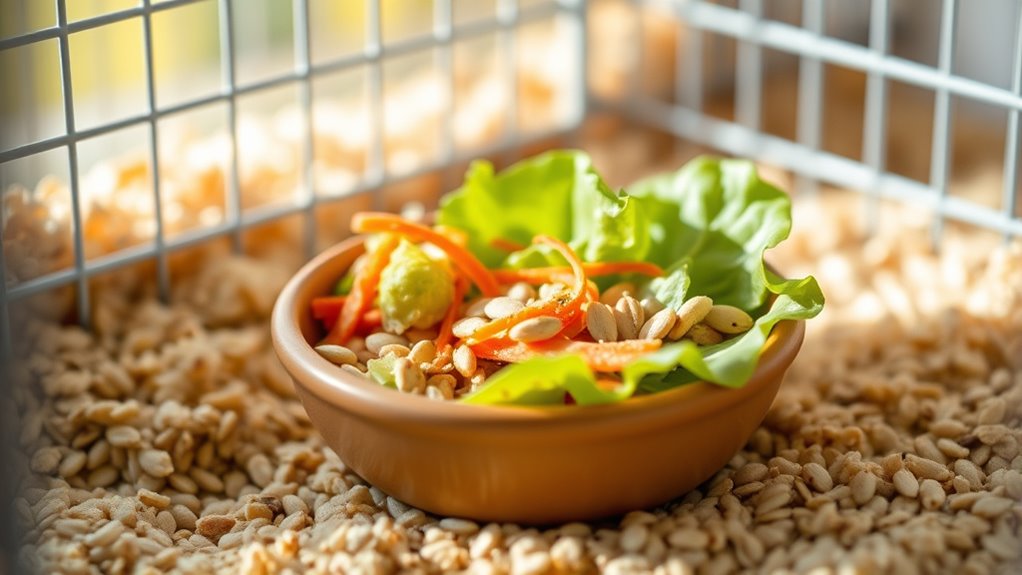To help your hamster live a long, healthy life, feed a balanced diet that includes commercial pellets or mixes for essential nutrients, complemented by small amounts of fresh fruits like apples and vegetables such as carrots or spinach. Offer occasional treats like cooked eggs or mealworms for extra protein, and always provide clean water. Keep a routine and monitor portion sizes to prevent health issues. If you want to discover more tips, you’ll find helpful advice ahead.
Key Takeaways
- Provide a balanced commercial hamster food as the primary diet to ensure consistent nutrition.
- Supplement with fresh fruits and vegetables in moderation to promote dietary diversity and enrichment.
- Offer small amounts of protein like cooked eggs or mealworms occasionally to support health and vitality.
- Ensure constant access to clean, fresh water to maintain hydration and prevent health issues.
- Maintain a consistent feeding routine and remove uneaten fresh foods promptly to promote digestion and prevent spoilage.

Ever wondered what the best diet is to keep your hamster healthy and happy? Understanding your hamster’s nutritional needs is essential for guaranteeing it lives a long, vibrant life. Hamsters are small creatures with specific dietary requirements, and their feeding habits play a vital role in maintaining overall health. When you focus on providing a balanced diet, you’re helping your pet stay energetic, resist illness, and develop properly.
Ensuring a balanced diet helps your hamster stay healthy, energetic, and resistant to illness.
The core of your hamster’s diet should be high-quality commercial hamster food. These specially formulated pellets or mixes are designed to meet their nutritional needs, including the right balance of proteins, fats, fiber, and vitamins. Always choose brands that list wholesome ingredients without unnecessary fillers or artificial additives. This guarantees your hamster gets consistent nutrition in every meal. While commercial food forms the foundation of their diet, it shouldn’t be the only thing they eat. Supplementing with fresh foods is crucial to mimic their natural foraging behavior and provide variety.
Fresh fruits and vegetables are excellent additions but should be given in moderation. Think small quantities of apple slices, carrots, or spinach. Avoid citrus fruits and anything acidic, as these can upset your hamster’s stomach. Also, steer clear of toxic foods like onions, garlic, or chocolate. When you’re offering these treats, remember that moderation is key—overfeeding fresh produce can cause diarrhea or obesity.
Protein sources are another vital component. Small amounts of cooked eggs, mealworms, or crickets can give your hamster the amino acids they need for muscle development and overall vitality. Just be cautious not to overdo it—these should be occasional treats, not daily staples. Fresh water is equally critical; always ensure your hamster has access to clean, fresh water to stay hydrated and support their metabolic processes.
Feeding habits are just as important as what you feed. Establish a routine by giving your hamster food at the same times each day, and remove any uneaten fresh foods after a few hours to prevent spoilage. Avoid sudden changes in their diet, as this can cause digestive upset. Monitoring portion sizes helps prevent obesity, which is common in hamsters that are overfed, especially with treats.
Frequently Asked Questions
Can Hamsters Eat Human Snacks Safely?
You might wonder if hamsters can eat human snacks safely. However, human snack risks include high sugar, salt, and fat, which can harm your hamster’s health. Instead, give safe snack options like small pieces of fresh fruits, vegetables, or hamster treats. Always avoid processed foods, chocolate, and anything toxic. By choosing safe snacks, you help guarantee your hamster stays healthy and happy without risking their well-being.
How Often Should I Change My Hamster’s Water?
Ever wonder how often you should change your hamster’s water? The secret to ensuring water freshness and proper hydration tips is to do it daily. Fresh water keeps your hamster healthy and prevents bacteria buildup that can make them sick. So, don’t skip this essential task—your tiny friend’s well-being depends on it. Regularly changing their water is a simple yet indispensable step toward a long, happy life for your hamster.
Are Wild Foods Safe for Pet Hamsters?
Wild foods might seem like a natural treat, but you should be cautious about wild food safety for your hamster. Foraging risks include exposure to pesticides, parasites, or toxic plants. Always avoid giving your hamster wild foods unless you’re certain they’re safe and free from contaminants. Stick to commercially prepared foods and safe vegetables to keep your pet healthy and avoid any potential health issues from wild foraging.
What Treats Are Healthy for Hamsters?
You might worry about giving your hamster treats, but natural treats like small pieces of fruit options can be healthy and safe. Instead of sugary snacks, opt for fresh, nutrient-rich options such as apple slices or berries. These natural treats provide essential vitamins and variety in their diet, making snack time both fun and beneficial. Just remember to give treats in moderation to keep your hamster happy and healthy.
Do Hamsters Require Vitamin Supplements?
You might wonder if hamsters need vitamin supplements. Typically, their balanced diet provides all essential nutrients, preventing nutritional deficiencies. However, in some cases, supplements can help, but you should always check supplement safety first. Over-supplementing can cause health issues. Consult your vet before adding vitamins to your hamster’s diet, ensuring they receive proper nutrition without risking excess or imbalance.
Conclusion
So, there you have it—feed your hamster well, and it might just outlive that tiny, squeaky gym buddy you call your pet. Mix in some fresh veggies, avoid the junk, and watch your hamster thrive—who knew loving your pet could be so easy? Remember, a happy hamster is a healthy hamster, and a healthy hamster means fewer trips to the pet store. Now go on, give that little furball the diet it deserves—after all, it’s counting on you!









